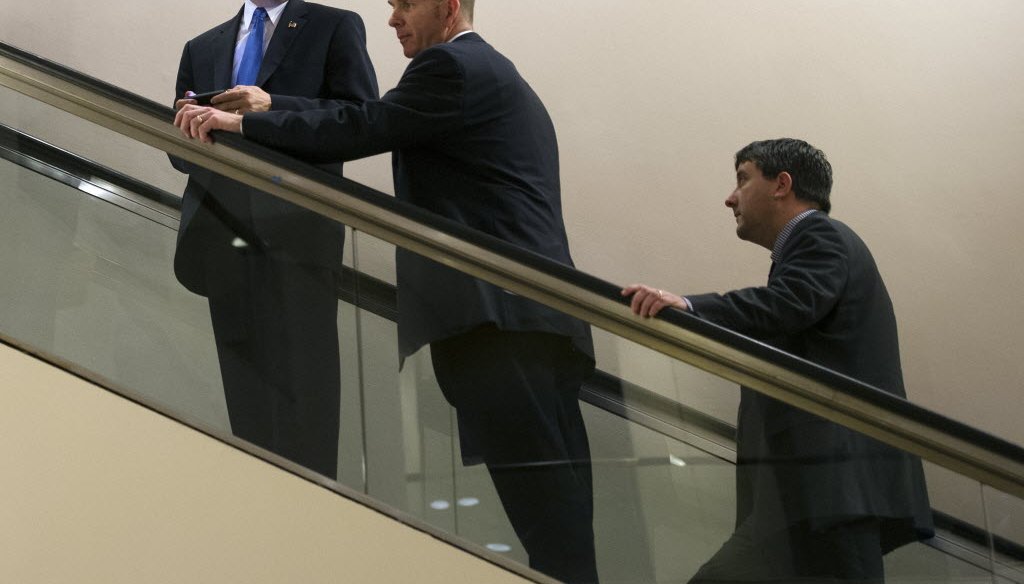Stand up for the facts!
Our only agenda is to publish the truth so you can be an informed participant in democracy.
We need your help.
I would like to contribute

Wisconsin Gov. Scott Walker, left, leaves a meeting during the National Governors Association winter meeting in Washington, D.C., on Feb. 22, 2014
The bright lights of the national media often cast a favorable glow on Wisconsin Gov. Scott Walker after the November 2013 release of his book, sowing speculation that he would be a contender for the Republican nomination for president in 2016.
A few months later, on Feb. 23, 2014, the lights might have made Walker feel like he was under the heat of an interrogation.
As he had with other media, Walker repeatedly refused to answer questions from Fox News Sunday host Chris Wallace about whether, while serving as the Milwaukee County executive, he knew about a secret email system that linked his county and campaign staffs. Those questions followed the release of 27,000 pages of emails that were exchanged during Walker’s time as county executive.
All of which has continued to stir national interest in Walker, who is considered a likely 2016 presidential prospect even as he campaigns for a second term as governor in November 2014.
Focusing on key themes of Walker’s tenure in Madison -- jobs, taxes and fiscal prudence -- here are five recent PolitiFact Wisconsin items that serve as a primer on the GOP governor.
Sign up for PolitiFact texts
1. Not on pace for 250,000 jobs
Walker’s signature promise during the gubernatorial campaign was that Wisconsin would create 250,000 private-sector jobs before his first term ends in January 2015.
When we last checked, on Jan. 30, 2014, the number was at 107,572, well behind the pace to reach 250,000.
2. But jobs are increasing
The next day, we rated False a claim by a state Rep. Brett Hulsey, D-Madison, that "every year since Gov. Walker and the Republicans have been in control of" state government, "we’ve created fewer jobs."
The trend is exactly the opposite of what the lawmaker claimed.
3. Property taxes dropped
In his State of the State speech in late-January 2014, Walker said: "With the tax controls we already put in place, property taxes on a typical home in December of 2014 will actually be lower than they were in December of 2010."
We rated that Mostly True, The reduction isn’t all because of the governor’s actions, and the claim is based on projections that could change. But Walker’s main point is solid based on the specific citation he highlighted from a respected source.
4. Income taxes mostly dropped
In December 2013, state Sen. Kathleen Vinehout, D-Alma, who opposed income tax cuts put in place by Walker and the GOP-controlled Legislature, asked voters if they knew that "if you make the average amount of people in Wisconsin, $50,000, you got $1.60 less a week in taxes? You might not have known that because they didn’t change the withholding tables, so it didn’t show up in your paycheck."
That statement earned a Mostly True. The average income cited was slightly high, but within reasonable rounding range. Vinehout used a reliable source for her tax-change numbers, and they are on target or very close, with the caveat that the analysis was set up for income ranges rather than a precise income. And she was right that the tax cut did not just show up in workers’ paychecks, due to inaction by the state.
(In 2011, we rated as a Promise Broken a pledge by Walker to oppose and veto all tax increases. The Legislative Fiscal Bureau determined Walker’s first state budget included three tax increases totaling $49.4 million over two years. The largest involved a reduction in a state tax credit for low-income working families, known as the earned income credit.)
5. Deficit turned surplus*
In January 2014, the nonpartisan Wisconsin Legislative Fiscal Bureau projected the state would have a $1 billion surplus at the end of the two-year budget period covering July 2013 to July 2015 -- almost all of it because tax collections are rising faster than expected. That helped back up a frequent Walker boast that he has turned state finances around.
But there is arguably an asterisk to the boast.
Also in January 2014, the Wisconsin Democratic Party stated: "The national economic recovery has led to higher than expected tax revenues and projected budget surpluses in nearly every state in the nation, including Wisconsin."
We rated the statement True. State budget watchers confirmed a widespread recovery in tax revenues among the states as the nation continues to edge out of the Great Recession.
Before we close, we’ll note a few other items you might be interested in:
-- A December 2013 article that solves the "mystery" of Walker’s college years and his entry into politics.
-- A September 2013 article on Walker’s critiques of Mitt Romney’s 2012 presidential campaign.
-- All factchecks on statements made by and about Walker.
-- The Walk-O-Meter, which tracks 65 campaign promises Walker said he would keep during his first term as governor.
To comment on this item, go to the Milwaukee Journal Sentinel’s web page.
Our Sources
PolitiFact Wisconsin items as noted.




















